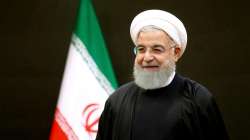Iran partially withdraws from nuclear deal
In a televised speech, President Hassan Rouhani said Tehran was reducing its own commitments under the agreement and would no longer respect limits on its reserves of low-enriched uranium -- currently limited to 300 kg -- and heavy water.

Iran will partially withdraw from the 2015 landmark nuclear deal signed with six other nations, President Hassan Rouhani announced on Wednesday and warned that his country will resume high level uranium enrichment if global powers fail to keep their commitments within the next 60 days.
His announcement comes exactly a year after the US abandoned the Joint Comprehensive Plan of Action (JCPOA) it had signed with Iran along with Russia, China, France and the UK plus Germany as co-signatories.
In a televised speech, Rouhani said Tehran was reducing its own commitments under the agreement and would no longer respect limits on its reserves of low-enriched uranium -- currently limited to 300 kg -- and heavy water.
He added that the remaining parties to the deal had been informed in advance of the move.
Rouhani issued a 60-day moratorium for rest of the signatories of the pact to fulfil Iran's demands and save the country's banking system and oil trade from international sanctions.
He accused "hardliners" in the US of working to undermine the agreement, saying it was "in the interests of the region and the world, but not the enemies of Iran, therefore they spared no effort since 2015 to undermine (the deal)", CNN reported.
"We have never been the first to violate the commitments or to wage wars, but at the same time we have never surrendered to bullying and will not do so, and we will certainly give appropriate response to any kind of aggression," he said.
Rouhani specified that the measure -- which would mean Iran would not abide by the condition to sell its enriched uranium and heavy water beyond given limits -- had a 60-day deadline during which Tehran would wait for response from the remaining JCPOA signatories.
The accord is aimed at curbing Iran's nuclear ambitions in return for sanctions relief, but Tehran-Washington tensions have risen since the US unilaterally withdrew from the deal. US President Donald Trump later reimposed sanctions on Tehran in August and November, mainly targeting its banking and oil sectors.
"If the five countries come to the negotiation table to come to terms with Iran's interests, particularly with regard to oil and banking, we would return to the previous position," the Iranian President said.
But if this doesn't happen, there would be further two-step response, according to Rouhani.
It would include Iran not abiding with the commitment to not enrich uranium beyond the agreed limit of 3.67 per cent and taking steps to complete the Arak Heavy Water Reactor, which was supposed to be built with the help of signatories to the deal, Efe news reported.
However, he said that the reduction in the number of nuclear commitments was aimed at saving the deal and that Iran had chosen the path of diplomacy and not war.
Rouhani added that Iran had not left the dialogue table and was always ready to negotiate "within the very framework of the JCPOA".
Slamming the other signatories to the deal, he said: "The European signatories... were doing well in lip service, but practically they were unable to implement what they vowed."
His announcement came after US Secretary of State Mike Pompeo made an unscheduled visit to Iraq and a US aircraft carrier was deployed to the Gulf region.